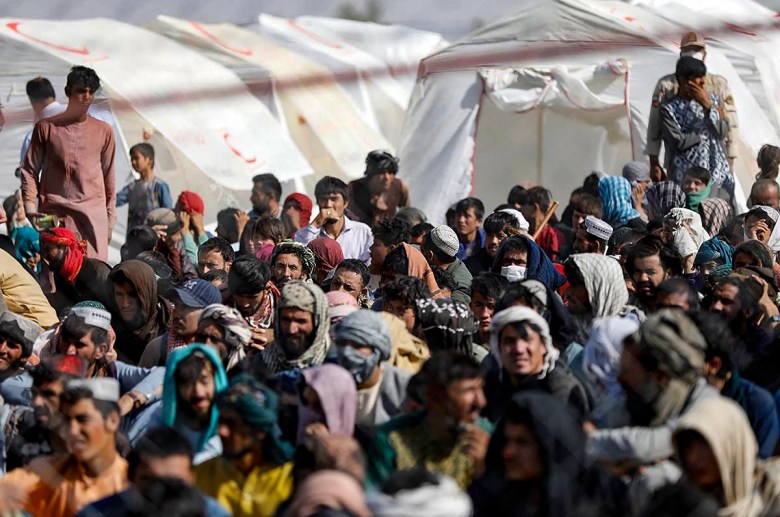PESHAWAR – China has reassured the Taliban that it is ready to begin development activities in Afghanistan via its ambitious multi-trillion-dollar Belt and Road initiative (BRI), as the war-torn country drifts toward an economic meltdown.
In what some see as Beijing’s tacit approval of the Afghan militant group’s interim government, China announced on Wednesday (September 8) US$31 million in aid for Afghanistan, saying the funds were a “necessary step” to restore order and “end anarchy.”
Chinese Foreign Minister Wang Yi said China would donate grain, winter supplies, vaccines and medicines worth 200 million yuan ($31 million) while addressing the Pakistan-hosted first virtual foreign ministers meeting of Afghanistan’s neighbors.
The announcement came amid dire aid agency predictions of an emerging famine-like situation, with the World Food Program (WFP) saying millions of Afghans are at risk of starvation amid a second spell of drought in three years that by some estimates wiped out 40% of crops this year.
A WFP report revealed that a third of the country’s population was facing deepening food insecurity with half of all children under five years of age malnourished at the beginning of 2021.
Food prices, meanwhile, have recently skyrocketed and nervous Afghans have started to run on banks, which reports indicate may be running out of cash.
The WFP claims that the socioeconomic impact of Covid-19 has put essential food items out of the reach of many Afghan families, with wheat prices hovering an estimated 24% above their five-year average.

Farrukh Saleem, an Islamabad-based Pakistani political scientist, economist and financial analyst, told Asia Times that Afghanistan previously raised around $2.8 billion in domestic revenues yet spent $11.4 billion annually.
He estimated that 49% of the total spending, or $5.7 billion, was allocated to security and defense, $2 billion (18%) on development, $1.8 billion (16%) on health and $800 million (7%) on administration.
He said his research shows that 75% of Afghan GDP was based on foreign aid and assistance while domestic revenues contributed only 25% to the economy.
He said Afghanistan was among the top recipients of US aid, amounting to around $6 billion per year, while multilateral agencies like the World Bank also richly contributed.
On-budget financing was provided by the Afghanistan Reconstruction Trust Fund, which Germany and the European Union helped to finance. But all of those mostly Western funding sources, he says, have now dried up and a cash crunch looms with the Taliban’s takeover.
“Banks have now opened up, but there is little cash in their vaults and ATMs had run out of cash a long time ago. The Afghan diaspora in the UAE, Germany, the US, Turkey, Canada, the UK and Sweden are unable to send money to their families in Afghanistan because Western Union and MoneyGram have also suspended their operations,” he added.
The US has frozen nearly $9.5 billion of Afghan central bank funds and stopped further remittances of cash, making it difficult for the recently announced Taliban-led government to access the finance need to run its new “Islamic Emirate” administration.

The International Monetary Fund (IMF), the World Bank, G-7 and European Union have all reportedly put a lid on new financial assistance to Afghanistan until the Taliban demonstrate a willingness to put together an “inclusive” government in Kabul, one that represents all ethnicities and both sexes.
The line-up announced on September 8, filled with Taliban hardliners, fell well short of that request, analysts said.
A Karachi-based analyst privy to information on Afghan affairs said that the newly announced Taliban government was made up mostly of UN-sanctioned individuals on terror and other accusations, including acting Prime Minister Muhammad Hassan Akhund, Deputy Prime Minister Abdul Ghani Baradar, Interior Minister Sirajuddin Haqqani, who has a US FBI $5 million on his head.
He said the Haqqanis, who managed to clinch four key ministries, were “once touted by US Admiral Mike Mullen as a veritable arm of Pakistan’s Inter-Services Intelligence Agency (ISI).”
“Beijing and Islamabad have thrown all books of ethics out of the window by embracing a coterie of 120 top leaders of the Taliban who are listed global terrorists by the United Nations Security Council and the US State Department.”
China seems to be looking the other way, despite its previous calls for an “inclusive” government in Kabul, and is ready to goad the Taliban into joining its strategic Belt and Road Initiative it hopes will connect Afghanistan and onward to Central Asian states.
Reports have indicated China is also planning to broaden its $60 billion China-Pakistan Economic Corridor (CPEC), a spoke of the BRI, to include Afghanistan including via a Peshawar-Kabul motorway.
Chinese Foreign Ministry spokesperson Wang Wenbin said in a recent briefing that the Afghan Taliban believed that the BRI was good for the development of Afghanistan and broader cooperation between regional countries.
“BRI has delivered tangible benefits and the country under the Taliban rule will provide a good environment for foreign investors,” he said.

There are already reports suggesting that China is trying to gain access to the Bagram airbase recently abandoned by withdrawing US troops. Beijing would likely need a bigger and well-equipped air facility than Kabul airport for its trade and investment activities in Afghanistan.
Former US diplomat Nikki Haley had recently warned that China might try to take over the strategic base.
“We need to watch China because I think you are going to see China make a move for Bagram Air Force Base. I think they are also making a move in Afghanistan and trying to use Pakistan to get stronger to go against India. So, we have got a lot of issues,” she said.


